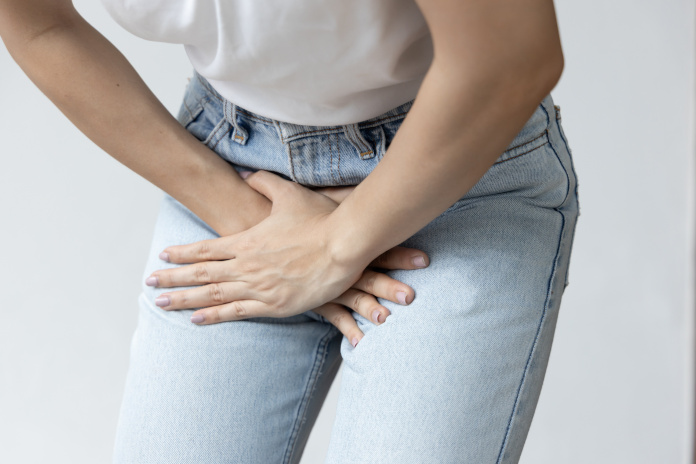Vaginal probiotics: which one should you choose to protect your intimate flora?
Are you looking for the best possible probiotic for maintaining healthy vaginal flora? Find out how to care for this particular microbiome which, though less well-known, is nonetheless crucial for good female intimate health

What exactly is the vaginal microbiome?
The vaginal microbiome is the collective term for all the microorganisms that live in the vagina. In simple terms, it’s as important to intimate health as the gut microbiota is to intestinal health!
Its function is two-fold: to defend the vaginal mucosa from pathogens by protecting it with a biofilm, and to maintain its pH within an ideal range (between 3.5 and 4.5) (1).
A guarantee of good vaginal health, this important ecosystem is, however, sometimes subject to imbalances, referred to as dysbiosis. This is usually caused by hormonal or environmental factors such as certain medications, stress, fatigue or inappropriate intimate hygiene (2).
In allowing particular bacterial strains to ‘get the upper hand’, vaginal dysbiosis paves the way for the development of gynaecological or urinary tract problems (3). When such problems become recurrent, they can cause significant genital discomfort and adversely affect a woman’s sex life.
The healthy microorganisms that populate the vaginal flora
200: that’s the approximate number of different species of bacteria so far identified in the vagina (4). But a closer look shows that a healthy vaginal microbiota displays far less diversity.
Here, it’s lactic bacteria (lactobacilli) which form the overwhelming bulk of its composition - almost 90%. This defensive battalion is what’s referred to as Döderlein flora.
While every profile is unique, most women will have between one and four dominant strains from among the following: Lactobacillus jensenii, Lactobacillus gasseri, Lactobacillus crispatus and Lactobacillus iners (5).
Other beneficial lactic colonisers include L. acidophilus, L. casei, L. Plantarum, L. rhamnosus and L. salivarius, which are also found in other regions of the body (such as the mouth and digestive tract) (6).
It’s worth noting that vaginal flora composition depends heavily on estrogen secretions (7). It can therefore vary significantly across the menstrual cycle, and during pregnancy and the menopause.
Which vaginal probiotic should you choose?
The purpose of a vaginal probiotic is to ‘re-seed’ the physiological flora with friendly microorganisms in order to restore a harmonious environment.
For optimal efficacy, you therefore need to focus on the above-mentioned lactobacilli. Other species of lactic bacteria such as bifidobacteria (used in yogurt fermentation) are also able to anchor themselves to the vaginal wall, and deserve a place in your microbiotic regimen (8).
While choosing the right bacteria is crucial, it’s equally important that they successfully implant themselves in the mucosa. To facilitate this tricky process, we recommend opting for a formulation that contains prebiotics, substances that nourish and support the growth of healthy bacteria (9).
Finally, there are two ways in which vaginal probiotics can be administered: the vaginal route (pessaries) or the traditional oral route (capsules, tablets …). The first is more direct, the second less restrictive. It’s all down to personal choice.
Combining 5 recognized strains of lactic bacteria (Lactobacillus rhamnosus, Bifidobacterium lactis, Lactobacillus salivarius, Lactobacillus acidophilus and Lactobacillus casei), the oral microbiotic Vaginal Health provides, in a single formulation, the ‘good bacteria’ of the vaginal microbiome, at a high dose of 5 billion microorganisms per capsule (10). It also contains fructo-oligosaccharides, non-digestible plant sugars, to support the bacteria’s growth (11).
Good habits to adopt to help take care of your intimate flora
There are also a number of everyday steps you can take to help maintain ahealthy balance in your vaginal flora:
- avoid vaginal douches, as they disrupt the vaginal microbiome and impair natural vaginal self-cleansing (12) ;
- once a day (no more, no less), wash your genitals with a gentle, or superfatted, soap. Never use antiseptic soaps, as they will adversely affect your levels of good bacteria, and don’t wash with water only as it affects the skin’s hydrolipidic film (13) ;
- try not to smoke. Nicotine tends to lower estrogen levels which are essential for the growth of lactobacilli (14) ;
- eat less sugar. While the link between diet and vaginal dysbiosis has yet to be clearly established, a high-sugar diet can promote the growth of yeasts (such as Candida albicans) (15) ;
- don’t self-medicate with antibiotics. Though sometimes necessary for treating a bacterial infection, certain antibiotics can modify or adversely affect the vaginal flora (16). If you regularly suffer from urogenital problems such as vaginitis or yeast infections, your doctor can prescribe preventive treatments;
- to prevent excessive moisture and allow your genital area to ‘breathe’, try to sleep without underwear (or at least, wear loose-fitting underwear) (17).
References
- Barrientos-Durán A, Fuentes-López A, de Salazar A, Plaza-Díaz J, García F. Reviewing the Composition of Vaginal Microbiota: Inclusion of Nutrition and Probiotic Factors in the Maintenance of Eubiosis. Nutrients. 2020;12(2):419. Published 2020 Feb 6. doi:10.3390/nu12020419
- Chen X, Lu Y, Chen T, Li R. The Female Vaginal Microbiome in Health and Bacterial Vaginosis. Front Cell Infect Microbiol. 2021;11:631972. Published 2021 Apr 7. doi:10.3389/fcimb.2021.631972
- De Seta F, Lonnee-Hoffmann R, Campisciano G, et al. The Vaginal Microbiome: III. The Vaginal Microbiome in Various Urogenital Disorders. J Low Genit Tract Dis. 2022;26(1):85-92. doi:10.1097/LGT.0000000000000645
- Mendling W. Vaginal Microbiota. Adv Exp Med Biol. 2016;902:83-93. doi: 10.1007/978-3-319-31248-4_6. PMID: 27161352.
- Chee WJY, Chew SY, Than LTL. Vaginal microbiota and the potential of Lactobacillus derivatives in maintaining vaginal health. Microb Cell Fact. 2020;19(1):203. Published 2020 Nov 7. doi:10.1186/s12934-020-01464-4
- Supernatants Inhibit Candida parapsilosis Pathogenic Potential upon Infection of Vaginal Epithelial Cells Monolayer and in a Transwell Coculture System In Vitro. Microbiol Spectr. 2022 May 2:e0269621. doi : 10.1128/spectrum.02696-21. Epub ahead of print. PMID: 35499353.
- Kaur H, Merchant M, Haque MM, Mande SS. Crosstalk Between Female Gonadal Hormones and Vaginal Microbiota Across Various Phases of Women's Gynecological Lifecycle. Front Microbiol. 2020;11:551. Published 2020 Mar 31. doi:10.3389/fmicb.2020.00551
- Freitas AC, Hill JE. Quantification, isolation and characterization of Bifidobacterium from the vaginal microbiomes of reproductive aged women. 2017 Oct;47:145-156. doi: 10.1016/j.anaerobe.2017.05.012. Epub 2017 May 25. PMID: 28552417.
- Reid G. Probiotic and prebiotic applications for vaginal health. J AOAC Int. 2012 Jan-Feb;95(1):31-4. doi: 10.5740/jaoacint.sge_reid. PMID: 22468339.
- Bertuccini L, Russo R, Iosi F, Superti F. Effects of Lactobacillus rhamnosus and Lactobacillus acidophilus on bacterial vaginal pathogens. Int J Immunopathol Pharmacol. 2017;30(2):163-167. doi:10.1177/0394632017697987
- Rousseau V, Lepargneur JP, Roques C, Remaud-Simeon M, Paul F. Prebiotic effects of oligosaccharides on selected vaginal lactobacilli and pathogenic microorganisms. 2005 Jun;11(3):145-53. doi: 10.1016/j.anaerobe.2004.12.002. Epub 2005 Feb 12. PMID: 16701545.
- Martino JL, Vermund SH. Vaginal douching : evidence for risks or benefits to women's health. Epidemiol Rev. 2002;24(2):109-124. doi:10.1093/epirev/mxf004
- Chen Y, Bruning E, Rubino J, Eder SE. Role of female intimate hygiene in vulvovaginal health: Global hygiene practices and product usage. Womens Health (Lond). 2017;13(3):58-67. doi:10.1177/1745505717731011
- Brotman RM, He X, Gajer P, et al. Association between cigarette smoking and the vaginal microbiota: a pilot study. BMC Infect Dis. 2014;14:471. Published 2014 Aug 28. doi:10.1186/1471-2334-14-471
- Van Ende M, Wijnants S, Van Dijck P. Sugar Sensing and Signaling in Candida albicans and Candida glabrata. Front Microbiol. 2019;10:99. Published 2019 Jan 30. doi:10.3389/fmicb.2019.00099
- Ahrens P, Andersen LO, Lilje B, et al. Changes in the vaginal microbiota following antibiotic treatment for Mycoplasma genitalium, Chlamydia trachomatis and bacterial vaginosis. PLoS One. 2020;15(7):e0236036. Published 2020 Jul 28. doi:10.1371/journal.pone.0236036
- Chen Y, Bruning E, Rubino J, Eder SE. Role of female intimate hygiene in vulvovaginal health: Global hygiene practices and product usage. Womens Health (Lond). 2017;13(3):58-67. doi:10.1177/1745505717731011
Keywords
3 Days
repeat customer
recommended by my doctor. easy to create an account. Discounts and specials are appreciated. packaging and delivery is dependable. Capsules easy to digest. I've had some some capsules and tablets that are broken inside their bottles.
Kokee
8 Days
Order was shipped on time and packaged…Wonderful Jobs!
Order was shipped on time and packaged excellently.
DMHoge
14 Days
great products and prices
great products and prices
Marie
20 Days
Easy to navigate site
Easy to navigate site, had what I was searching for, good price. easy order-check out
James Tucker
26 Days
My skin is clearing up nicely!
Pretty good for my skin so far.
Christian
28 Days
The new packaging is excellent
The new packaging is excellent - finally! No more squashed boxes and torn envelopes.
GORAN
29 Days
Great Product
Great Product
Larry Garrett
33 Days
Quick shipping
Quick shipping; good price. No issues!
Mary McCarty
35 Days
Thr product is very good and is helping…
Thr product is very good and is helping me on my health. Then is always on time
LUGO Luz
37 Days
Buying was fine
Buying was fine. I had problems with the website not recognizing my login info, and had to call to get it fixed. Other than that, everything was good.
David S. Clark
38 Days
Your super maca and super ginseng are…phenomenal
Your super maca and super ginseng are phenomenal supplements that compliment each other when taking them together. Fantastic feeling of well-being and lots of mid day energy without the crash.
Keith Mason
40 Days
I have had amazing results with every…
I have had amazing results with every supplement I've purchased. I am extremely satisfied with this company
kirstin Torres
40 Days
Fine products
Fine products . They are on the leading edge of online supplements. The only issue -so far-is they sometime run out of subscription items.
Jason Argos
43 Days
The ordering process is very user…
The ordering process is very user friendly and the products always come in a timely manner.
CARTER Rhonda
44 Days
The price for Dr
The price for Dr. Pero's AC-11 is reasonable and in line with his views. (my former colleague). Keep it pure.
CAMPBELL Clayton




